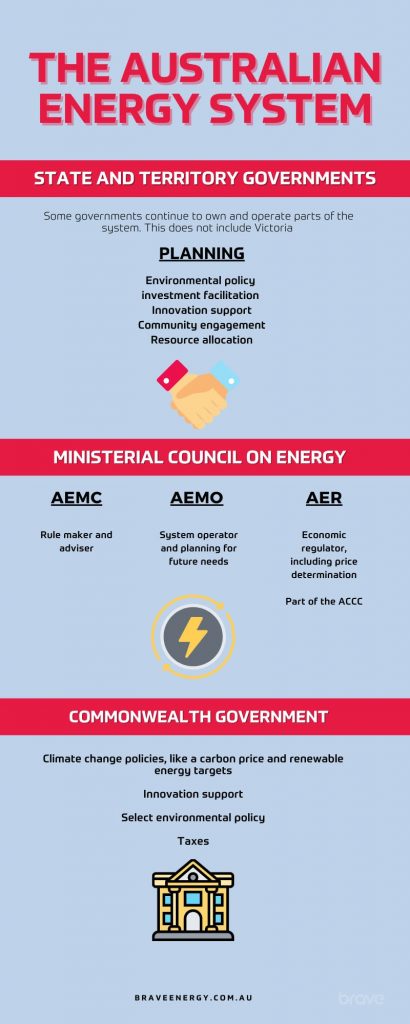Changing energy rules
There are several bodies that change market rules. Of these, the AEMC is a key organisation that makes and amends the National Energy Rules under the National Energy Laws. These rules and the amendments impact how market participants can operate in the industry and retail sectors.
Energy ministers that are responsible for the legislative and regulatory framework of Australian energy markets must ensure that there are clear rules for the energy market, so that all participants, including companies, suppliers and customers understand their rights and responsibilities. These rules also determine how companies can operate and participate in the generation and retail sectors, which tend to be naturally competitive. They also govern the economic regulation of electricity transmission and distribution networks and gas pipelines.
Under the National Energy Laws, all the AEMC’s work is guided by the three legislated national energy objectives; National electricity objective (NEO), National gas objective (NGO), National energy retail objective (NERO). Each objective requires an explicit focus on the long-term interests of energy consumers. The rules play a central role in governing how the energy market operates. There are also a number of other laws that influence outcomes in the energy market, such as state and territory gas and electricity legislation, competition and consumer laws, and renewable energy targets. While these regulatory changes may seem innocuous, as they add up year on year, so do the costs to industry players.
Another organisation that has an essential role within the energy market is the Australian Energy Market Operator (AEMO). Established by the Council of Australian Governments to manage the National Electricity Market, (NEM) the role of the AEMO is to manage the electricity and gas market systems across Australia. The AEMO ensures that regulations are followed by stakeholders within the energy market, such as energy suppliers and distributors. It also holds open consultations on the energy regulations for these key stakeholders, allowing them an opportunity to engage and participate in the ongoing planning, development and operation of the energy markets. The consultations also incorporate working groups and forums, that encourage energy stakeholders to discuss relevant issues and share information.
Below is a diagram that outlines the key Australian energy systems organisations.
With the rapid changes happening within the energy industry itself, so too the rate of regulations and naturally, the rate of consultations has been steadily increasing in recent years. While these consultations and working groups are essential to the success of the AEMO’s work, they do add another cost to energy stakeholders to attend, in the form of resources and time allotted.
Changing the energy rules is a unique process, and these changes often result in compliance costs – a large part of which is software systems. With these frequent updates, it’s increasingly difficult for energy suppliers to have a long-term view of how to manage ongoing regulatory changes and the financial effects and resources that must be used to instate them.
Focus on the future
There is still a range of proposed and existing regulatory changes to come, and many of these changes will impact the resourcing of energy businesses. In addition to the above, rule changes and market reviews are constantly being updated, with some implementations booked years in advance. Some notable upcoming examples are the SDR Review and consumer data rights, which will be costly for energy retailers and industry suppliers to update and enforce.
For businesses to succeed, it’s essential to plan compliance into their operational costs to effectively manage the accelerated and continued rate of regulatory change.
With the effects of the COVID-19 pandemic and the increasing rate of changes in the energy industry, energy businesses need to use effective strategies in order to minimise costs and increase agility. Brave’s systems have been designed to manage these issues, by minimising and separating compliance software from core operational systems that are expensive to alter.
So talk to the industry experts, Brave Energy Systems to learn more about how your business can be supported for today, and for the future.
